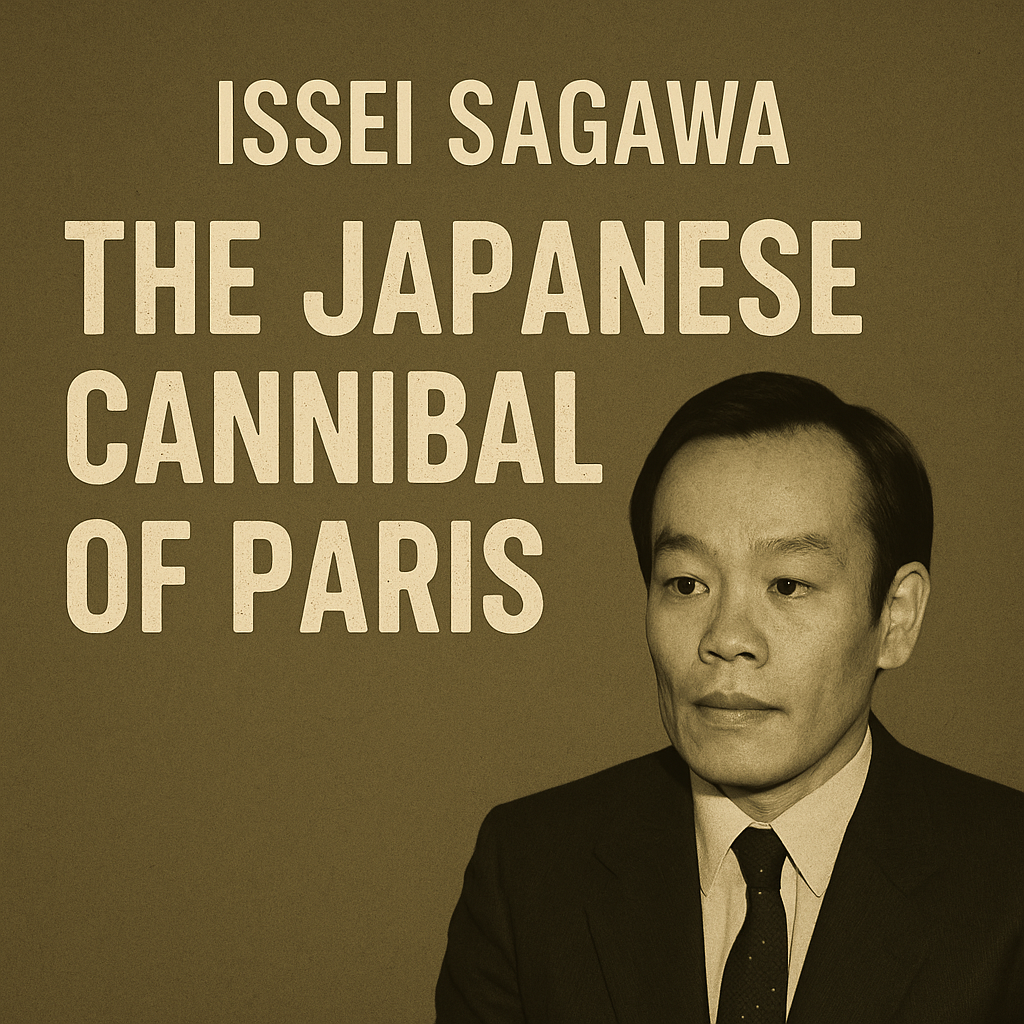⏲️ Estimated reading time: 6 min
Issei Sagawa The Japanese Cannibal of Paris. In 1981, Paris became the setting for one of the most disturbing murder cases of the century. Issei Sagawa, a Japanese student, shocked the world by killing and cannibalizing his classmate. This is the chilling story behind the crime and its aftermath.
Issei Sagawa – The Japanese Cannibal in Paris (France, 1981)
Few true crime cases disturb the human psyche as deeply as that of Issei Sagawa. Nicknamed “The Japanese Cannibal,” Sagawa committed a grotesque act in June 1981 that shocked France, Japan, and the rest of the world. In Paris, he murdered and cannibalized a fellow student. The events that followed raised complex legal and psychological debates especially when he walked free despite confessing to the crime.
Who Was Issei Sagawa?
Issei Sagawa was born on April 26, 1949, in Kobe, Japan. Doctors delivered him prematurely, and he grew up frail and often sick. His wealthy family provided him with a privileged upbringing, but Sagawa struggled socially and emotionally. From a young age, he fantasized about eating women a dark urge that he would carry into adulthood.
In 1977, he traveled to Paris to pursue a doctorate in literature at the Sorbonne. Although he immersed himself in intellectual pursuits, Sagawa never stopped nurturing his sinister desires.

The Victim: Renée Hartevelt
Renée Hartevelt, a 25-year-old Dutch student, studied alongside Sagawa at the Sorbonne. Friends described her as intelligent, cultured, and multilingual. She formed a casual friendship with Sagawa, unaware of the danger lurking behind his polite demeanor.
Sagawa, on the other hand, developed an obsession with her. He admired her beauty and intellect but viewed her as an object to consume both metaphorically and literally.
The Murder: June 11, 1981
Sagawa invited Renée to his apartment under the pretense of translating poetry. When she turned her back to read aloud, he retrieved a rifle and shot her in the neck. She died instantly.
Rather than panic, Sagawa calmly began fulfilling his cannibalistic fantasies. He spent the next two days dissecting and eating parts of her body. He stored some flesh in his refrigerator, photographed his actions, and even tried eating her raw. According to his later confessions, he believed consuming her would let him absorb her essence.
Police Capture Sagawa
After several days, Sagawa placed Renée’s remains in two suitcases. He hailed a taxi and headed to the Bois de Boulogne, a park in Paris. There, he attempted to dump the suitcases into a lake. A bystander noticed blood seeping from the luggage and immediately notified the police.
Authorities arrested Sagawa at the scene. During questioning, he confessed without hesitation and described the crime in detail.
The French Legal System Declares Him Out Of Control
French psychiatrists assessed Sagawa and diagnosed him with severe mental illness. They ruled him unfit to stand trial. Instead of imprisoning him, authorities committed him to a French psychiatric hospital.
Although many expected him to remain institutionalized for life, a shocking turn of events awaited.
Japan Allows Sagawa to Walk Free
In 1984, French authorities deported Sagawa to Japan. There, local officials attempted to prosecute him. However, the French had sealed all legal documents, including the confession and evidence, which made prosecution impossible.
Japanese psychiatrists examined Sagawa and deemed him sane. Because no charges remained, they had no legal grounds to hold him. After just 15 months in a Japanese psychiatric facility, he walked free.
Public outrage exploded. Many viewed this as a grotesque failure of justice and diplomacy.
Sagawa’s Disturbing Life After Release
Rather than disappear from the public eye, Sagawa embraced notoriety. He published books describing the murder in graphic detail. Media outlets invited him to television programs. He even acted in adult films and reviewed restaurants ironically, food critics sometimes interviewed him.
While some saw him as a case study in psychopathology, many considered his media presence grotesque and offensive. Critics accused the media of glamorizing a killer and disrespecting Renée Hartevelt’s memory.
Sagawa’s Death
Issei Sagawa died on November 24, 2022, at the age of 73. After suffering multiple strokes, he lived under the care of his brother during his final years. Pneumonia eventually claimed his life.
His death reignited public interest in the case and reminded the world that he never faced real justice for what he did.
The Case’s Cultural Impact
Sagawa’s horrific crime inspired books, documentaries, and films:
- Documentary: Cannibal Superstar (2002)
- Books: In the Fog (written by Sagawa himself), Tokyo Cannibal (by various authors)
- Music: Bands like Macabre referenced the case in their songs
Writers, filmmakers, and academics continue to analyze the ethical, legal, and psychological complexities of the case. The story has entered the dark canon of modern criminal folklore.
Legal and Ethical Lessons
This case exposes disturbing gaps in international law:
- A confessed killer exploited legal systems and went free.
- Psychiatric diagnoses varied between countries.
- Sealed records prevented cooperation between justice systems.
The Issei Sagawa case sparked debates about criminal insanity, legal jurisdiction, and whether media should profit from real-life horror.
Remembering Renée Hartevelt
Amid the media circus surrounding Sagawa, people often forget Renée Hartevelt. She was more than a victim she was a promising young woman with intellectual brilliance and a bright future. Her life deserves remembrance and respect.
The World Reacts
Outrage over the case remains even decades later. Victim advocacy groups, legal scholars, and the general public continue to discuss how a confessed cannibal evaded punishment and turned into a celebrity. The story also provokes deeper questions about justice, rehabilitation, and the power of media in shaping public perception.
🔔For more tutorials like this, consider subscribing to our blog.
📩 Do you have questions or suggestions? Leave a comment or contact us!
🏷️ Tags: Issei Sagawa, Renée Hartevelt, Japanese Cannibal, Paris murder, true crime, cannibalism, international law, criminal psychology, infamous killers, justice system
📢 Hashtags: #IsseiSagawa #TrueCrime #Cannibalism #RenéeHartevelt #ParisCrime #JapaneseKiller #InfamousMurders #CriminalPsychology #JusticeFailed #InternationalLaw
Final Reflection
The story of Issei Sagawa forces us to confront uncomfortable truths about our legal systems, our fascination with criminal minds, and our responsibility to victims. Despite his confession and public admission, Sagawa evaded justice and profited from his crime. But behind his infamy lies the forgotten story of Renée Hartevelt, whose promising life ended in the most horrifying way imaginable. Let us remember her name not his.
Only logged-in users can submit reports.
Discover more from HelpZone
Subscribe to get the latest posts sent to your email.

